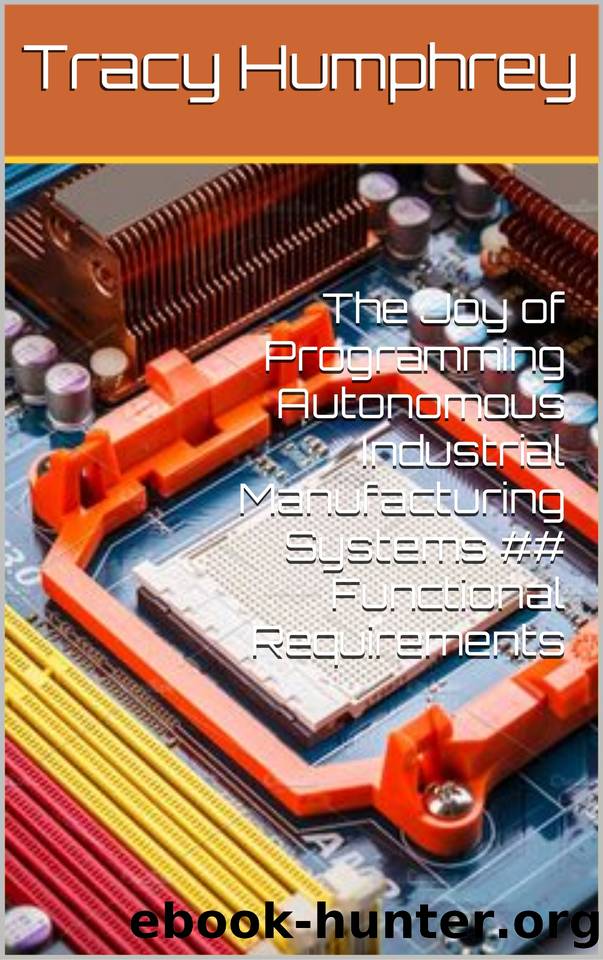The Joy of Programming Autonomous Industrial Manufacturing Systems ## Functional Requirements by Humphrey Tracy

Author:Humphrey, Tracy
Language: eng
Format: epub
Published: 2024-04-10T00:00:00+00:00
There are a
**Acceptance testing** is the process of testing the system to ensure that it meets the
requirements of the customer. This can be done by using a variety of different testing
frameworks and tools. Acceptance testing is important for ensuring that the customer is
satisfied with the system and that it is able to meet their needs.
## What is acceptance testing?
Acceptance testing is a type of testing that is performed by the customer or end-user
to verify that the system meets their requirements. This type of testing is typically
performed after the system has been developed and is ready to be deployed. The goal of
acceptance testing is to ensure that the system is able to perform the functions that the
customer
requires and that it is free of defects.
## Why is acceptance testing important?
Acceptance testing is important for ensuring that the customer is satisfied with the
system and that it is able to meet their needs. If the system is not properly tested, it may
not be able to perform the functions that the customer requires or it may contain defects
that could cause problems for the customer. This could lead to the customer being
dissatisfied with
the system and refusing to accept it.
## How is acceptance testing performed?
Acceptance testing can be performed in a variety of ways. The specific methods that
are used will depend on the type of system being tested and the requirements of the
customer.
Some of the common methods of acceptance testing include:
* **Functional testing:** This type of testing verifies that the system is able to
perform the functions that the customer requires. Functional testing can be performed
manually
or using automated testing tools.
* **Usability testing:** This type of testing evaluates the ease of use of the system
for the customer. Usability testing can be performed by having the customer use the system
and providing feedback on their experience.
* **Performance testing:** This type of testing verifies that the system is able to
perform under a variety of load conditions. Performance testing can be performed by
simulating
different load conditions and measuring the system's performance.
* **Security testing:** This type of testing verifies that the system is secure from
unauthorized access or misuse. Security testing can be performed by simulating attacks on
the
system and evaluating the system's ability to withstand those attacks.
## What are the benefits of acceptance testing?
There are a number of benefits to performing acceptance testing, including:
* **Ensuring that the system meets the customer's requirements:** Acceptance
testing helps to ensure that the system is able to perform the functions that the customer
Download
This site does not store any files on its server. We only index and link to content provided by other sites. Please contact the content providers to delete copyright contents if any and email us, we'll remove relevant links or contents immediately.
The Mikado Method by Ola Ellnestam Daniel Brolund(22540)
Hello! Python by Anthony Briggs(21721)
Secrets of the JavaScript Ninja by John Resig Bear Bibeault(20296)
Dependency Injection in .NET by Mark Seemann(19635)
The Well-Grounded Java Developer by Benjamin J. Evans Martijn Verburg(19403)
Kotlin in Action by Dmitry Jemerov(19348)
OCA Java SE 8 Programmer I Certification Guide by Mala Gupta(18840)
Algorithms of the Intelligent Web by Haralambos Marmanis;Dmitry Babenko(17650)
Adobe Camera Raw For Digital Photographers Only by Rob Sheppard(16968)
Grails in Action by Glen Smith Peter Ledbrook(16799)
Sass and Compass in Action by Wynn Netherland Nathan Weizenbaum Chris Eppstein Brandon Mathis(14281)
Secrets of the JavaScript Ninja by John Resig & Bear Bibeault(12244)
Test-Driven iOS Development with Swift 4 by Dominik Hauser(10947)
A Developer's Guide to Building Resilient Cloud Applications with Azure by Hamida Rebai Trabelsi(10598)
Jquery UI in Action : Master the concepts Of Jquery UI: A Step By Step Approach by ANMOL GOYAL(10069)
Hit Refresh by Satya Nadella(9122)
The Kubernetes Operator Framework Book by Michael Dame(8539)
Exploring Deepfakes by Bryan Lyon and Matt Tora(8365)
Robo-Advisor with Python by Aki Ranin(8307)
